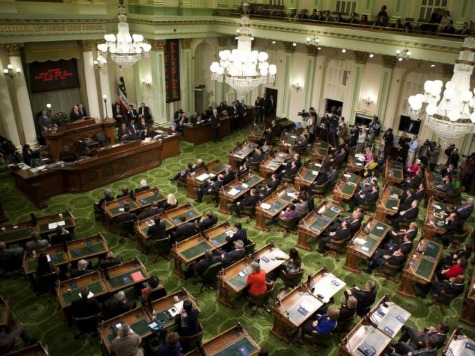Just two days after April Fool’s Day, the California State Assembly passed House Resolution 29, denouncing outsourcing of government services to private contractors, and pledging oppose all future “outsourcing of public services and assets.”
Despite staunch opposition from the League of Cities and other local government agencies across the state, the bill was first read on the Assembly floor in the morning of April 3rd, substantially amended, and passed the very same day on a Democrat party-line vote. The California Assembly is now demanding that all janitors in the State of California be unionized.
Despite staunch opposition from the League of Cities and other local government agencies across the state, the bill was first read on the Assembly floor in the morning of April 3, substantially amended, and passed the very same day on a Democrat party-line vote. The California Assembly is now demanding that all janitors in the State of California be unionized.
According to Dan Carrigg, Legislative Director for League of California Cities, who was quoted by Justin Hyer of publicceo.com, “By fast-tracking this legislation, our state’s leadership really cut out an opportunity for public visibility on this issue as well as for members of the Assembly to understand the full impact of this resolution.” The League believes that even though the legislation is seem ceremonial, it is meant to serve as a written threat that the Assembly now opposes outsourcing of public services and assets, which they believe will harm “transparency, accountability, shared prosperity, and competition.”
Although one of the bill’s sponsors, Assemblyman Roger Hernandez (D-West Covina), told the Associated Press that HR 29 was aimed at stopping the “moving taxpayer resources more often than not into the hands of the 1 percent,” the real objective of HR 29’s is to force local officials to adopt The Taxpayer Empowerment Agenda (TEA).
The TEA is a nationwide effort by the American Federation of State, County and Municipal Employees to unionize millions of janitorial and service jobs often held by what they refer to as undocumented workers with promises of paying the workers a “Living Wage“.
The janitorial and carpet cleaning industry according to First Research, consists of about 50,000 janitorial companies and about 9,000 carpet and upholstery cleaning companies with combined annual revenue of about $40 billion. Major companies include ServiceMaster, ABM Industries, Coverall Health-Based Cleaning System and Jani-King. The industry is very fragmented with the top 50 largest operators only generating about 30% of revenue. The business for janitorial services is labor-intensive and the average annual revenue per employee is about $35,000.
The janitorial services industry, according to IBIS World research, is expected to grow at about twice the growth of the economy. Most of the growth over the next 10 years is expected to come from education, health, medical and government sectors outsource many of their cleaning needs. Revenue is forecast to increase to $47.7 billion in 2016.
The most complete national information available on wages of the 2.3 janitors and cleaning workers is from 2010. The median hourly wage averages $10.68. The lowest 10% earned less than $7.86 per hour, and the top 10% earned more than $17.88 per hour. All those earning over $17.88 were unionized and almost all were in government.
The median hourly wages for California in industries employing the largest numbers of janitors were: local government = $13.14; public schools = $13.04; colleges and professional schools = $12.37; medical and hospitals = $11.76; commercial buildings = $9.48. Although Dr. Amy K. Glasmeier of the Massachusetts Institute of Technology, has said that the living wage for Los Angeles is $11.37, the American Federation of State, County and Municipal Employees are demanding a minimum of $15 per hour.
“We are shocked and appalled at the rush to approve this ill-conceived and thoughtless attempt to further limit local governments’ ability to provide effective and efficient municipal services,” remarked Sam Olivito, Executive Director for California Contract Cities Association that have tried to outsource most government services. He further added that HR 29 and any legislation that follows eliminating private contractors will have a negative financial effect on California cities and vital municipal services could be cut.y readers.

COMMENTS
Please let us know if you're having issues with commenting.